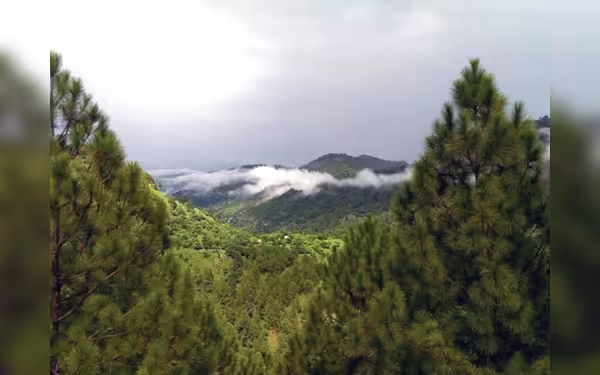Thursday, November 7, 2024 03:55 PM
Margalla Hills Under Threat from Tree Felling Activities
- Tree felling threatens Margalla Hills' ecosystem.
- Gas station plans raise environmental concerns.
- Local communities fear long-term impacts.
 Image Credits: tribune.com.pk
Image Credits: tribune.com.pkTree felling in Margalla Hills raises serious environmental concerns amid plans for a gas station, threatening local ecology and communities.
The Margalla Hills, a stunning natural treasure located near Islamabad, are facing a significant threat due to tree felling activities. This area is not only a vital ecological zone but also a popular destination for nature lovers and tourists. The recent decision to establish a gas station and a service area along the Murree Road has raised serious concerns among environmentalists and local residents alike. The impact of such developments on the delicate ecosystem of the Margalla Hills cannot be underestimated.
According to Irfan Niazi, the Deputy Director General (DDG-I) of Environment, two specific sites have been selected on the "Right of Way" of Murree Road for these new constructions. He stated, "The Right of Way on all major Roads and Avenues are therefore left for such services." This statement highlights the ongoing conflict between development and environmental preservation. While infrastructure improvements are essential for the growing population and tourism, the ecological cost of such actions must be carefully considered.
The Margalla Hills are home to diverse flora and fauna, many of which are already under threat from urbanization and pollution. The removal of trees not only disrupts the habitat of various species but also contributes to soil erosion and climate change. Trees play a crucial role in maintaining the balance of our environment by absorbing carbon dioxide and releasing oxygen. Therefore, the decision to cut down trees for a gas station raises serious ethical questions about our priorities as a society.
Moreover, the establishment of commercial facilities in such sensitive areas can lead to increased traffic, noise pollution, and further environmental degradation. Local communities, who rely on the natural beauty of the Margalla Hills for their livelihoods, are understandably concerned about the long-term implications of these developments. It is essential for authorities to engage with local residents and environmental experts to find a balanced approach that prioritizes both development and conservation.
While the need for infrastructure development is undeniable, it should not come at the expense of our precious natural resources. The Margalla Hills are a vital part of Pakistan's heritage, and protecting them should be a collective responsibility. As citizens, we must advocate for sustainable practices that ensure the preservation of our environment for future generations. It is time to rethink our approach to development and prioritize the health of our planet over short-term gains.













